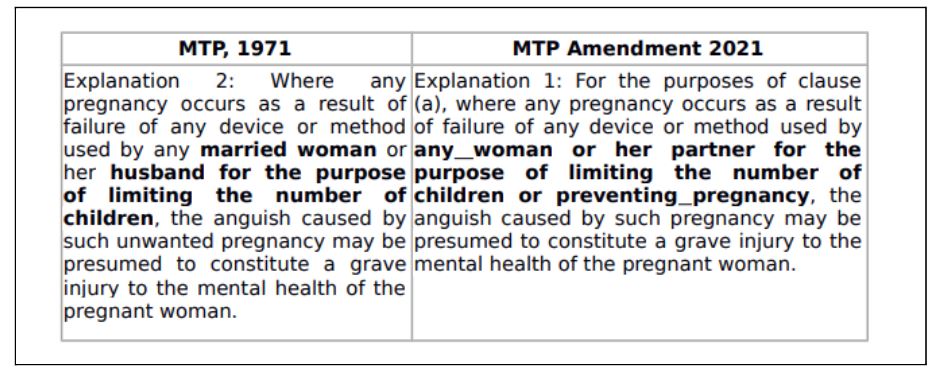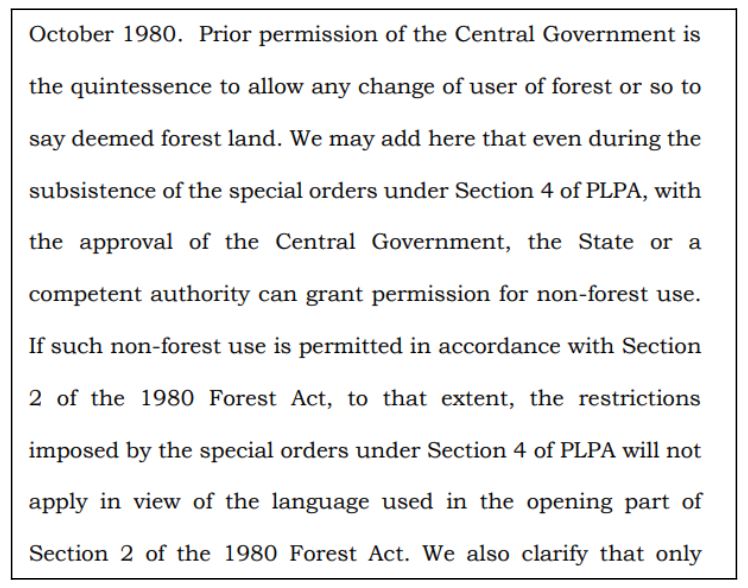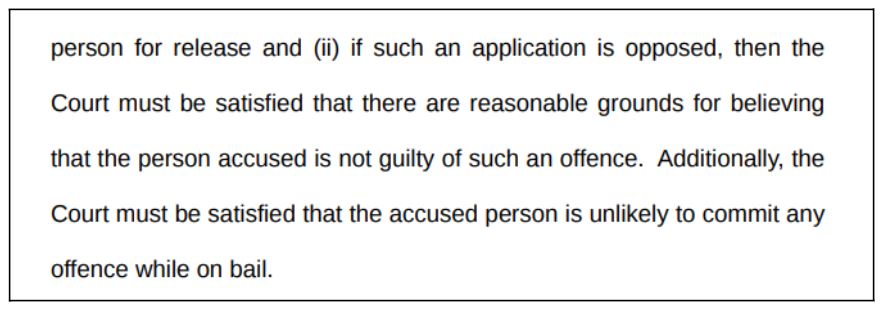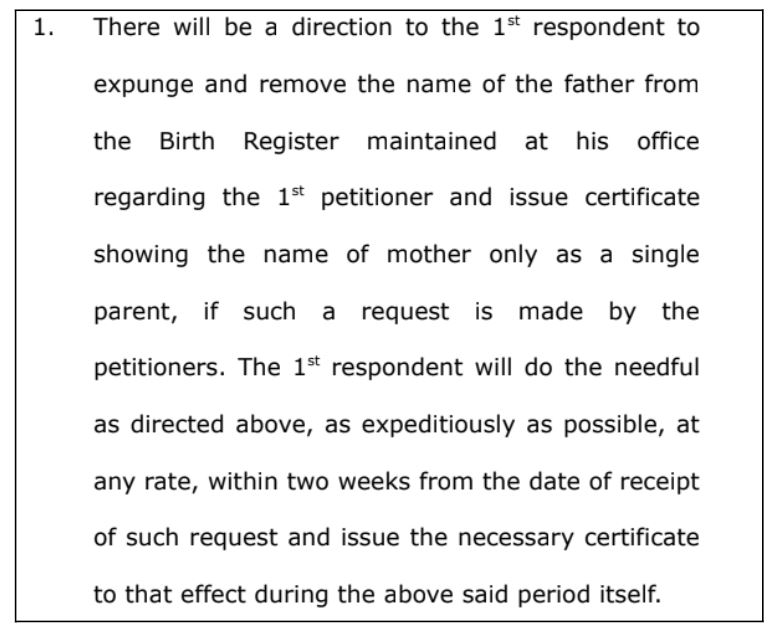In this week’s review of Court Judgments, we look at the Supreme Court’s order in which it said that unmarried women cannot be denied medical termination of pregnancy, that State governments may permit non-forest activities on forest land upon prior approval of the Centre, Kerala HC’s order that persons have the right to include only mother’s name in official documents.
SC: Unmarried woman cannot be denied medical termination of pregnancy
In X vs. The Principal Secretary, Health & Family Welfare Department, the petitioner was a native of Manipur and lived in Delhi. She was in a consensual relationship in which she became pregnant. She was 24 weeks pregnant when the Supreme Court heard her case. Her ultrasound scan revealed that a single intrauterine pregnancy of a term of twenty-two weeks. She decided to terminate the pregnancy after her relationship failed. Citing familial issues, the petitioner stated that she was a BA graduate and that she wouldn’t be able to raise a child in the absence of livelihood. When she approached the Delhi High Court, it observed that an unmarried woman, whose pregnancy arises out of a consensual relationship, is not covered by the Medical Termination of Pregnancy Rules, 2003.
However, the Supreme Court bench comprising Justices DY Chandrachud, Surya Kant and AS Bopanna noted that amendments were made to the Act in 2021 substituting the word “husband” with “partner”, and also included all women including divorcees, widows, minors, disabled and mentally ill women and survivors of sexual assault or rape, into the ambit of the Act. It added that the legislation has recognized the reproductive choice of a woman and her bodily integrity and autonomy. That is, she is entitled to choose whether or not to bear a child as she has the right to life with dignity and the right to privacy under Article 21 of the Constitution. The order also stated that ‘there is no basis to deny unmarried women the right to medically terminate the pregnancy when the same choice is available to other categories of women’. The Supreme Court also directed the Director of AIIMS, Delhi to constitute a medical board and carry out an abortion if the foetus can be aborted without danger to the life of the petitioner.

SC: State governments may permit non-forest activities on forest land upon prior approval of the Centre
In Narinder Singh vs. Divesh Bhutani, the Supreme Court was considering the writ petitions and appeals filed by owners of marriage halls and restaurants, residents, etc. lying in the land covered under special orders issued under Section 4 of the Punjab Land Preservation Act, 1900 (PLPA, 1900). The appeals challenged the order of the National Green Tribunal which ordered that non-forest activities should not be conducted on the subject lands. According to NGT, the lands covered under Section 4 of PLPA, 1900 were ‘forest lands’ as defined in the Forest (Conservation) Act, 1980. This was challenged in the Supreme Court. The issue considered by the Supreme Court was whether land covered under a special order issued by the Government of Haryana under Section 4 of the PLPA, 1900 is a ‘forest land’ within the meaning of the Forest (Conservation) Act, 1980.
The Supreme Court bench comprising of Justices AM Khanwilkar, AS Oka and CT Ravikumar, held that the lands covered by the special orders issued under Section 4 of PLPA, 1900, have all the trappings of forest lands within the meaning of the Forest Act, 1980. The Bench observed that the State is mandated to protect and improve the environment and safeguard the forests. Further, the precautionary principle requires the Government to anticipate, prevent and remedy or eradicate the causes of environmental degradation including acting sternly against the violators.
The Bench also elaborated on the meaning of ‘forest’ under the Forest Act of 1927 and the 1980 Forest Act and noted that the 1980 Act does not provide for an absolute prohibition on the use of any forest land for any non-forest purposes. The State Governments or competent authorities can permit the use of forest land for non-forest purposes, provided they get the prior approval of the Central Government. The purpose of such a provision is to check the depletion of green cover. The Central Government shall permit only such activities which do not cause environmental degradation.

SC: Credible, plausible grounds are required to believe that the accused is not guilty of offence and grant bail
In Narcotics Control Bureau (NCB) vs. Mohit Aggarwal, the NCB had received secret information that a parcel which was suspected to contain narcotic drugs was stored at the godown of a courier company in Delhi. On conducting search proceedings, the NCB recovered the suspected parcel which contained 50,000 Tramadol tablets weighing 20 kgs. The respondent confessed that he illegally purchased and sold narcotic substances. He was taken into custody in January 2020 following which he moved two applications for grant of bail before the Special Judge, NDPS. The applications were rejected. However, the High Court granted bail to an accused in the case on grounds that there was no material evidence apart from the confessional statement.
The Supreme Court Bench of Chief Justice NV Ramana, and Justices Krishna Murari and Hima Kohli noted that the respondent’s disclosure is what lead the NCB to the supplier’s godown. Further, the CDR details of the mobile phones of all co-accused including the Respondent showed that they were in touch with each other. Stating that the High Court should not have passed the order supporting the respondent citing lack of material evidence, the Court cancelled the bail order and directed that he be taken back into custody.

It also noted that Section 37 of the Narcotic Drugs and Psychotropic Substances Act, 1985 which talks about bail states that there should be reasonable grounds for believing that the accused is not guilty of such offence and that he is not likely to commit any offence while on bail. The expression “reasonable grounds” used in the Section means credible, plausible grounds for the Court to believe that the accused person is not guilty of the alleged offence. For arriving at any such conclusion, facts and circumstances must exist such that the Court can believe that the accused person would not have committed such an offence.
Kerala HC: Persons have the right to include only their mother’s name in official documents
In XXX vs. Registrar of Births and Deaths, Pathanamthitta Municipality and ors., the petitioners were a mother and son (first petitioner). The mother had conceived her son when she was a minor under mysterious circumstances because of which the father’s name of the first petitioner was recorded differently in different documents. The petition was filed to expunge and remove the son’s father’s name from the birth register maintained by the office. They wanted a certificate showing the mother’s name only as a single parent.
Justice P. V Kunhikrishnan of Kerala High Court observed that the child of an unwed mother is also a citizen of India, and nobody could infringe any of his/her fundamental rights. The children of unwed mothers and the children of rape victims could also live in this country with the rights of privacy, dignity, and liberty and no one could intrude in their personal life. Referring to past judgements, he opined that it is the right of a person to include his mother’s name alone in the birth certificate, identity certificates and other documents and allowed the petition.

Delhi HC: Subjecting a citizen to police scrutiny for no good reason is an invasion of their right to privacy
In Jindal Kumar vs. NCT of Delhi & Anr, a kalandra was issued when a quarrel occurred after access by the petitioner’s wife to the terrace was not allowed by the respondent. Kalandra is a notice issued under section 107 of Code of Criminal Procedure (CrPC) against a person against whom there is information that he is likely to commit a breach of the peace or disturb the public tranquillity or any other wrongful act leading to breach of peace or disturbance to the public. It was submitted that the counsel appearing on behalf of the petitioner had submitted that he was not a regular complainant and admitted that the kalandra was initiated against both the parties, which was later disposed of. The petitioner also stated that no action was taken against his complaint. Justice Asha Menon of Delhi High Court dismissed the petition and observed that subjecting a citizen to police scrutiny including verification of personal documents for no good reason would be an invasion of their right to privacy.
Featured Image: Review of Court Judgments


